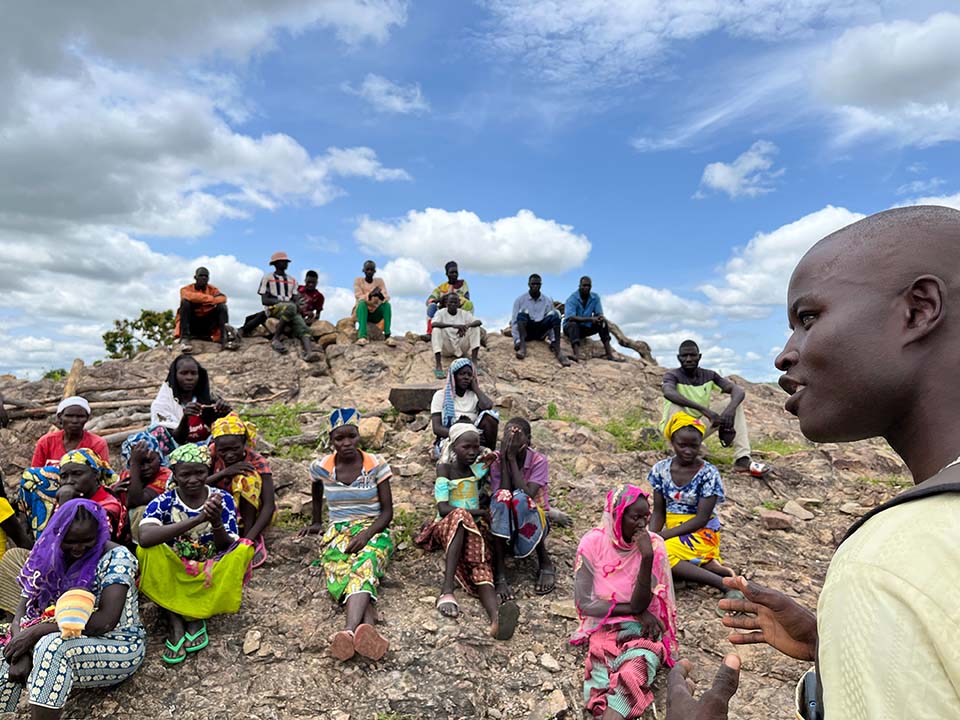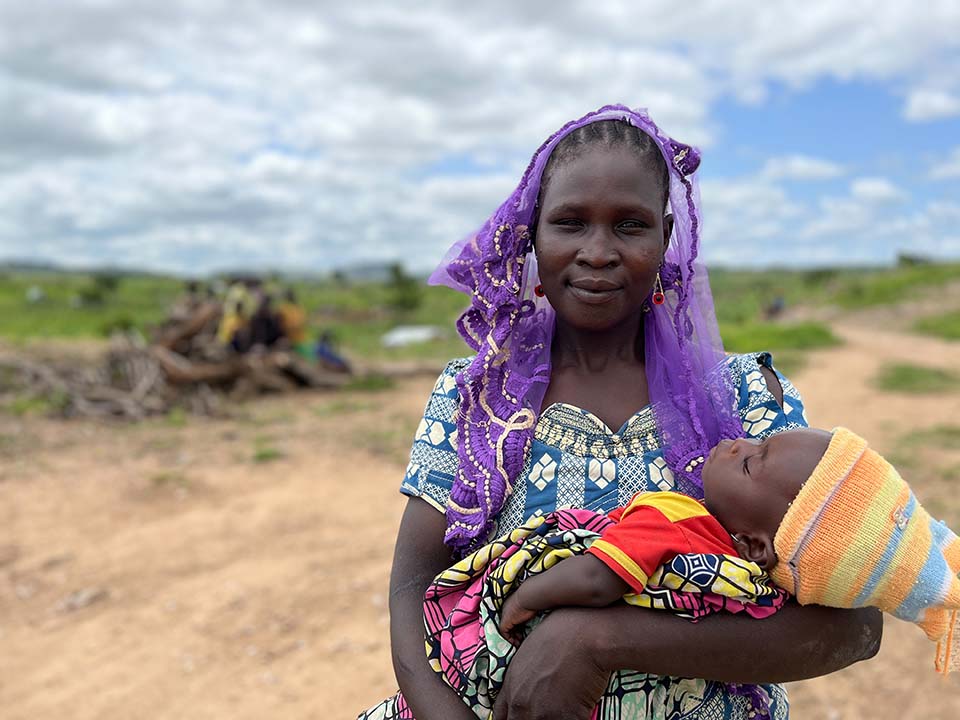
Building Peaceful Communities in the Far North region of Cameroon
On a large slab of rock in the small mountainous village of Zamalva, Cameroon, a group of 30 or so men and women sit, listening to youth peace ambassadors from Catholic Relief Services’ STaR II project. It is midday, but threatening rain clouds offer protection from an otherwise strong sun. The discussion is lively.
Today’s topic: how to avoid and resolve problems among various ethnic and religious groups.

Boubakari, right, a peace facilitator in CRS’ STaR II project, leads a discussion on social cohesion in Zamalva village in the Far North region of Cameroon.
Photo by Jennifer Lazuta/CRS
The population of Zamalva has more than tripled in the past few years. Hundreds of families whose communities near the Nigerian border were attacked by Boko Haram fled south, hoping to find safety and security in Zamalva and neighboring villages. They had to rely on the generosity of the host community for shelter, food, clothes and other necessities.
“They arrived here with nothing,” said Angele, a mother of eight from Zamalva. “We tried to help those that we could. We tried to support them, but it was difficult.”
The influx of new arrivals was too massive. It quickly put a huge strain on the village’s already limited resources.
The lines at the water pump were long, and it often ran dry before the end of the day. There was not enough food to go around. The newcomers wanted to farm but there was no available land. They wanted to enroll their children in school but had no money for the fees. The host community grew resentful of the arriving families. Additionally, many began to fear for their safety, suspecting their new neighbors—many from different religious and ethnic backgrounds—of being terrorists in disguise.
“When we first arrived, it wasn’t easy to approach the host community,” says Walla, who arrived two years ago after her home was set on fire during the night. “We were often insulted by the community here. They told us we couldn’t use the water pump anymore. We didn’t want to be a burden to them, but we had no place else to go. Our homes were gone. We had nothing.”

Walla holds her 10-month-old daughter. She just attended a discussion on how to avoid and resolve problems among various ethnic and religious groups in the community, led by peace ambassadors from CRS’s STaR II project.
Photo by Jennifer Lazuta/CRS
The situation slowly improved as local churches and other organizations distributed food and household items. Displaced families slowly built their shelters. Deals were made to loan plots of land so they could plant their food. Additional wells were dug. Friendships formed.
But the mutual resentment between the host community and new families still simmered beneath the surface.
Then the CRS’ STaR II project identified and trained youth peace ambassadors and peace facilitators selected from within the community. To help strengthen relationships, these community volunteers lead door-to-door campaigns to encourage group dialogue. They help promote reconciliation and conflict resolution between families and within households.
“[We] take the time to talk with people, explain why a certain behavior is harmful, and help peacefully resolve problems when they arise,” explains Boubakari, a 23-year-old peace facilitator in Zamalva. “This helps people understand the value of living together in harmony because when there isn’t peace, that again brings war and that destroys a community. So we need to put an end to the problems.”
His peace partner in the community, Sarah Medougue, a 19-year-old peace ambassador who focuses on working with young people in the village, says her age and experience resettling here helps people listen to her.
“It’s important for me to help people learn how they can better live together. People listen to my messages because they are important lessons for all of us. Everyone gets along better now.”
A participant in the discussion, Angele, says they are so grateful for these activities.
“We have learned so much from these discussions,” she says. “They have helped us see each other in a different light. There is understanding now. So the difference has been remarkable.”
The Stabilization and Reconciliation in the Lake Chad Region, or STaR, project is funded by the German Federal Ministry for Economic Cooperation and Development via the German Development Cooperation. Phase I started in 2019 in Chad, Niger, and Nigeria, while Phase II launched in September 2021 and expanded to include Cameroon. The project has activities under four components, including infrastructure development and rehabilitation, economic revitalization, social cohesion and local governance. In Cameroon, CRS partners with the Diocese of Maroua-Mokolo, to implement the project.

